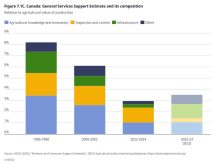Reuters – Fertilizer deliveries to Brazilian farmers could fall between five and seven per cent this year, an executive at Brazilian trade group Anda said Oct. 5, citing figures from analysts and industry estimates.
Anda, which represents global suppliers, said farmers have delayed purchases or decided not to buy fertilizer this season amid a rise in prices sparked by Russia’s invasion of Ukraine.
After the conflict began, Brazil hurried to secure supplies, as it depends on imports for 85 per cent of its domestic use. That pressured ports and other logistics.
Read Also

AAFC organic research program cut
Canada’s organic sector says the loss of a federal organic research program at Swift Current, Sask., will set the industry back.
“We brought in more fertilizers than the farmer needed at that time,” said Ricardo Tortorella, Anda’s executive director, referring to the first half of 2022. “This clogged up ports. All of them are full until today.”
Tortorella said potential weather problems, uncertainty over Chinese demand for crops and the war in Ukraine also accounted for weaker fertilizer demand. Logistics bottlenecks at ports had not affected deliveries to farmers, he said.
“The grower’s atypical stance is natural,” he said. “The farmer has to calculate risks and do a lot of math.”
Volatile fertilizer prices have somewhat abated, which could raise demand for fertilizers in the short term, Tortorella and an analyst said.
While the fear of global fertilizer shortages drove up imports in Brazil, it also changed the outlook for domestic production, which is slated to grow for the first time in 15 years, according to Tortorella.
Anda’s latest data for fertilizer deliveries in July, released last week, pointed to the possibility of reduced deliveries this year.
Deliveries in July fell by almost 30 per cent, with deliveries between January and July were down nearly nine per cent to 21.7 million tonnes.
Reduced deliveries will not compromise expectations for a bumper grain crop, Tortorella said.














